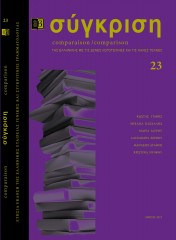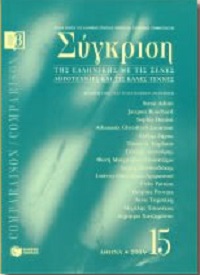Από τους Μικρασιάτες στους Μικρούς Ασιάτες: Εγκυμονούντα Αγόρια και Κορίτσια Πολεμιστές ως Λυτρωτικές Συγγραφικές Μεταφορές στη Λιλίκα Νάκου και στη Μαξίν Χονγκ Κίνγκστον
Περίληψη
Λεπτομέρειες άρθρου
- Πώς να δημιουργήσετε Αναφορές
-
Dokou, C. (2013). Από τους Μικρασιάτες στους Μικρούς Ασιάτες: Εγκυμονούντα Αγόρια και Κορίτσια Πολεμιστές ως Λυτρωτικές Συγγραφικές Μεταφορές στη Λιλίκα Νάκου και στη Μαξίν Χονγκ Κίνγκστον. Σύγκριση/Comparaison/Comparison, 23, 133–154. https://doi.org/10.12681/comparison.25
- Τεύχος
- Τόμ. 23 (2013)
- Ενότητα
- Άρθρα
Οι συγγραφείς των άρθρων που δημοσιεύονται στο περιοδικό Σύγκριση διατηρούν τα δικαιώματα πνευματικής ιδιοκτησίας επί των άρθρων τους, δίνοντας στο περιοδικό το δικαίωμα της πρώτης δημοσίευσης. Άρθρα που δημοσιεύονται στο περιοδικό Σύγκριση διατίθενται με άδεια Creative Commons 4.0 και σύμφωνα με την άδεια μπορούν να χρησιμοποιούνται ελεύθερα, με αναφορά στο/στη συγγραφέα και στην πρώτη δημοσίευση για μη κερδοσκοπικούς σκοπούς και με δικαίωμα τροποποίησης μόνον με παρόμοια διανομή (αν αναμείξετε, τροποποιήσετε, ή δημιουργήσετε πάνω στο υλικό, πρέπει να διανείμετε τις δικές σας συνεισφορές υπό την ίδια άδεια όπως και το πρωτότυπο).
Λήψεις
Αναφορές
Deborah Tannen, Lilika Nakos, Boston,Twayne Publishers, 1983
Deborah Tannen, “Lilika Nakos and Other Greek Women Writers”, Pilgrimage, vol. 2 (1976)
Linos Politis, A History of Modern Greek Literature, Oxford, Clarendon Press, 1973
Catherine Belsey, “Constructing the Subject: Deconstructing the Text”, Feminisms: An Anthology of Literary Theory and Criticism, ed.Robyn R. Warhol and Diane Price Herndl, NewJersey, Rutgers UP, 1991
Maxine Hong Kingston, The Woman Warrior:Memoirs of a Childhood among Ghosts, London,Picador, 1976
Bobby Fong, “Maxine Hong Kingston’s Autobiographical Strategy in The Woman Warrior”,Biography, vol. 12 no. 2 (Spring 1989)
Ya-Jie Zhang, “A Chinese Woman’s Response to Maxine Hong Kingston’s The Woman Warrior”, MELUS, vol. 13, no. 3/4 (Autumn-Winter 1986) 103. For a basic account of the philology–pro and con–on Kingston’s work, see Sau-ling Cynthia
Wong (ed.), Maxine Hong Kingston’s The Woman Warrior: A Casebook, New York, Oxford, 1999
Sau-Ling Cynthia Wong, “Necessity and Extravagance in Maxine Hong Kingston’s The Woman Warrior: Art and the Ethnic Experience”,MELUS, vol. 15, no. 1 (Spring 1988)
Marilyn Chin, “A MELUS Interview:Maxine Hong Kingston”, MELUS, vol. 16, no. 4(Winter 1989-Winter 1990)
Margaret Miller, “Threads of Identity in Maxine Hong Kingston’s The Woman Warrior”,Biography, vol. 6, no. 2 (Winter 1983)
Sue Ann Johnston,“Empowerment through Mythological Imaginings in Woman Warrior”, Biography, vol. 16, no. 2 (Spring 1993)
Victoria Myers, “The Significant Fictivity of Maxine Hong Kingston’s The Woman Warrior”, Biography, vol. 9, no. 2(Spring 1986) 112-125; also, Rufus Cook, “Cross-Cultural Wordplay in Maxine Hong Kingston’s China Men and The Woman Warrior”, MELUS,vol. 22 no. 4 (Winter 1997)
Lan Dong, “Writing Chinese America into Words and Images: Storytelling and Retelling of The Song of Mu Lan”, The Lion and the Unicorn,vol.30, no. 2 (April 2006)
Lilika Nakos, “Maternity”, Ta Nea, 10-5-1930: 5 and O Kyklos, vol. 5 (1936)
Marilyn R. Farwell, “Toward a Definition of the Lesbian Literary Imagination”, Signs:Journal of Women In Culture and Society, vol. 14,no. 1 (1988)
“Maternity”, trans. Allan Ross Macdougall, The Reader’s Digest Greatest Short Stories of the World,New York, The Reader’s Digest Association, 1981
Thomas Doulis, Disaster and Fiction: Modern Greek Fiction and the Asia Minor Disaster of 1922, Berkeley, U of California P, 1977
Mariella Doumanis, Mothering in Greece:From Collectivism to Individualism, London, Academic Press Inc., 1983
Marilyn Yalom, Maternity, Mortality, and the Literature of Madness, University Park, ThePennsylvania UP, 1985
Sandra Gilbert and Susan Gubar, (1979) The Madwoman in the Attic: The Woman Writer and the Nineteenth Century Literary Imagination,Yale Nota Bene ed., New Haven and London, Yale
UP, 2000
Edward Said, Representation of the Intellectual:The 1993 Reith Lectures, London, Vintage,1994
Marcia Ian, Remembering the Phallic Mother: Psychoanalysis, Modernism, and the Fetish, Ithaca; London, Cornell UP, 1993
Deborah Tannen, “Mothers and Daughters in the Modern Greek Novels of Lilika Nakos”,Women’s Studies, vol. 6, no. 2 (1979)
Marianne Hirsch, “Maternal Narratives:‘Cruel Enough to Stop the Blood’”, Reading Black,Reading Feminist: A Critical Anthology, Henry Louis Gates Jr. (ed.) New York, Meridian, 1990
Lilika Nakos, “Lilika Nakos Writes About Her Mother”, trans. D. Tannen, Women’s Studies,vol. 6 no. 2 (1979)
Edward Said, Orientalism, London,Vintage, 1979.
Deborah Tannen, “Coming of Age in the Modern Greek Prose of Lilika Nakos”, Regionalism and the Female Imagination, vol. 4, no. 1 (Spring 1978)
Nina Paleou, “Motherhood and National Development: Defining Factors in the Formation of Female Identities in the 1900-1940 Period”,European Society of Modern Greek Studies (2010),
http://www.eens.org/EENS_congresses/2010/Paleou_Nina.pdf (accessed February 13, 2012).
Melanie Klein, “The Importance of Symbol-Formation in the Development of the Ego” (1930), The Writings of Melanie Klein: Love, Guilt, and Reparation: And Other Works 1921-1945, New York, Free Press,1984
Luce Irigaray, “The Power of Discourse and the Subordination of the Feminine”, This Sex Which Is Not One, trans. Caterine Porter with Carolyn Burke, Ithaca, NY, Cornell UP, 1977
Bradley John Monsma, “‘Active Readers… Observe Tricksters’: Trickster Texts and Cross-Cultural Reading”, Modern Language Studies, vol.26 no. 4 (Autumn 1996)
King-Kok Cheung, “‘Don’t Tell’: Imposed Silences in The Color Purple and The Woman Warrior”, PMLA, vol. 103, no. 2 (March 1988)
Marjorie T. Lightfoot, “Hunting the Dragon in Kingston’s The Woman Warrior”, MELUS, vol.13 no. 3/4 (Autumn-Winter 1986)
LeiLani Nishime, “Engendering Genre:Gender and Nationalism in China Men and The Woman Warrior”, MELUS, vol. 20, no. 1 (Spring 1995)
Ruth Y. Jenkins, “Authorizing Female Voice and Experience: Ghosts and Spritis in Kingston’s The Woman Warrior and Allende’s The House of the Spirits”, MELUS, vol. 19, no. 3 (Autumn 194)
Leslie W. Rabine, “No Lost Paradise: Social Gender and Symbolic Gender in the Writings of Maxine Hong Kingston”, Signs, vol. 12, no. 3(Spring 1987)
Deborah Madsen, “(Dis)figuration: The Body as Icon in the Writings of Maxine Hong Kingston”, The Yearbook of English Studies, vol. 24 (1994)
Jeehyun Lim, “Cutting the Tongue:Language and the Body in Kingston’s ‘The Warrior Woman’”, MELUS, vol. 31, no. 3 (Fall 2006)
Shelley Fisher Fishkin and Maxine Hong Kingston, “Interview with Maxine Hong Kingston”, American Literary History, vol. 3, no. 4 (Winter 1991)
Feng Lan, “The Female Individual and the Empire: A Historicist Approach to Mulan and Kingston’s Woman Warrior”, Comparative
Literature, vol. 55, no. 3 (Summer 2003)
Maxine Hong Kingston, “Cultural Mis-Readings by American Reviewers”, Asian and Western Writers in Dialogue: New Cultural
Identities, Guy Amirthanayagam (ed.) London,Macmillan, 1982
Lori Tsang, “From warrior to poet:Maxine Hong Kingston talks to Lori Tsang about her latest book”, The Women’s Review of Books, vol.19, no. 10-11 (July 2002)
Paul Outka, “Publish or Perish: Food,Hunger, and Self-Construction in Maxine Hong Kingston’s The Woman Warrior”, Contemporary Literature, vol. 38, no. 3 (Autumn 1997)
Shirley K. Rose, “Metaphors and Myths of Cross-Cultural Literacy: Autobiographical Narratives by Maxine Hong Kingston, Richard Rodriguez, and Malcolm X”, MELUS, vol. 14, no.1 (Spring 1987)
Linda Hunt, “ ‘I Could Not Figure out What Was My Village’: Gender vs. Ethnicity in Maxine Hong Kingston’s The Woman Warrior”,MELUS, vol. 12, no. 3 (Autumn 1985)
Umberto Eco, “The Myth of Superman”,The Critical Tradition: Classic Texts and Contemporary Trends, ed. David Richter, Boston, Bedford Books, 1998
Yuan Shu, “Cultural Politics and Chinese-American Female Subjectivity: Rethinking Kingston’s ‘Woman Warrior’”, MELUS, vol. 26, no.2 (Summer 2001)




